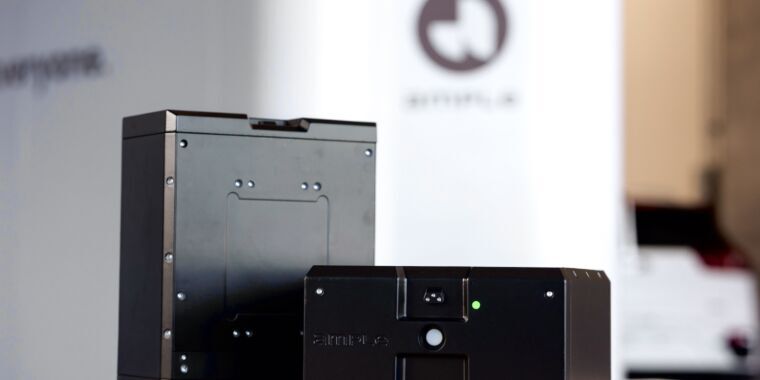Ample’s model involves the startup owning the actual battery modules—this solves the problem of an EV owner having their own new pack replaced by an older and possibly degraded one.
This does not solve the problem. It just avoids the problem.
AFAIK nobody works on really solving this problem.
Its also a terrible way of reducing charging time for anything that doesn’t have an enormous battery like an electric Lorry/Semi. Even then its like 30 minutes for 70% charge for the Tesla Semi, which is roughly the same as a mandated break anyway for the driver.
What is more useful is making sure all EV batteries are easily swappable by third parties as this will massively extend the lifespan of EVs if you do not need to go back to the main dealer for a much marked up battery replacement when the cars battery stops holding a useful amount of charge past the 10 year mark.
How does the business half of battery swapping work? Obviously you’d pay for charging the battery but who actually owns the battery? Who is responsible for the battery degradation?
Has to be a subscription or a per-swap fee. Probably subscription to account for the degradation point.
But, you essentially have a subscription for car energy now, you probably pay weekly for gasoline. If they can make it competitive to that I think they have a shot. Say $50/week in gas, means $200/month…seems like that could be profitable. And at least some of the money goes all to the car company, not a million different GA stations, which is a good incentive for them to try to make it work.
$200/month to drive an EV is really expensive though. I drive 30.000km/year and pay around $70/month in electricity for the car. The average driver in my country drives something like 12.000km/year, so that’s closer to $30/month in electricity. That makes $200 seem insane.
I assume they wouldn’t have as big an upfront cost on the car though, since they never actually buy the batteries.
If you look at prices for something like the Nio cars without the battery here in Europe, they’re hardly competitive with regular EVs. The price saving is substantially less than a battery replacement. With the battery subscription (doesnt even include the day-to-day charging, which isbkikelu to be done at homeequating to a battery life of just under 6 years, it seems like a pretty bad deal.
And for everyday driving, you’re likely still charging at home overnight, so the battery rental cost is just extra on top of that.
Yeah, I mean I don’t think it’s a particularly viable plan overall. A lease for a Nissan Leaf is what? £300 a month?
But Americans seem convinced that they drive coast to coast on a regular basis, so an electric car will never do. I can see who they’re trying to appeal to, although 99% of electric car use would be covered by a charger at home.
I don’t think a subscription would quite work for this. Somebody traveling 10k a month isn’t going to consume the same amount of batteries as someone who’s commuting 1 mile away each day. I certainly wouldn’t want to pay the same amount. Kind of an all you can eat shrimp situation, if you will
I don’t really get this. Swap and go gas cylinders have existed for ages. You buy the bottle initially, and then it costs x amount to swap for a full one. And when it reaches its expiry its replaced by the company doing the swapping
Battery degradation just needs to be factored in to the cost of the swap
Gas cylinders do not cost ten grand though…
This is the best summary I could come up with:
A small fleet of rideshare Fiat 500e electric vehicles will become testbeds for battery-swap technology in 2024.
The experiment is being conducted by Ample, a startup working on battery swaps, and Stellantis, Fiat’s parent company, the Verge reported today.
This isn’t Ample’s first test of its battery-swapping technology; in 2021 it started a small trial in the Bay Area to demo its modular battery, which replaces the existing traction battery in an EV and allows Ample’s automated swap stations to switch out depleted packs for charged ones.
As we detailed last time we looked at Ample’s technology, the EVs require some engineering work for this to all be possible.
Ample has to design a structural frame to replace the existing battery pack that will instead contain the swappable modules, while still conforming to the engineering requirements of the original pack—down to the same fasteners, bolts, and connectors.
The test, scheduled to begin next year in Madrid, will involve Fiat 500es that are operated by Free2Move, Stellantis’ car-sharing mobility venture.
The original article contains 282 words, the summary contains 169 words. Saved 40%. I’m a bot and I’m open source!
Fun fact, until recently, Tesla batteries were made to be swappable at stations. (According to Monroe live) They have minimal screws all their connectors facing upwards so they can be removed by a robot.
Here’s a video of a Tesla demo of a battery swap. https://youtu.be/HlaQuKk9bFg
Here is an alternative Piped link(s):
https://piped.video/H5V0vL3nnHY
Piped is a privacy-respecting open-source alternative frontend to YouTube.
I’m open-source; check me out at GitHub.





